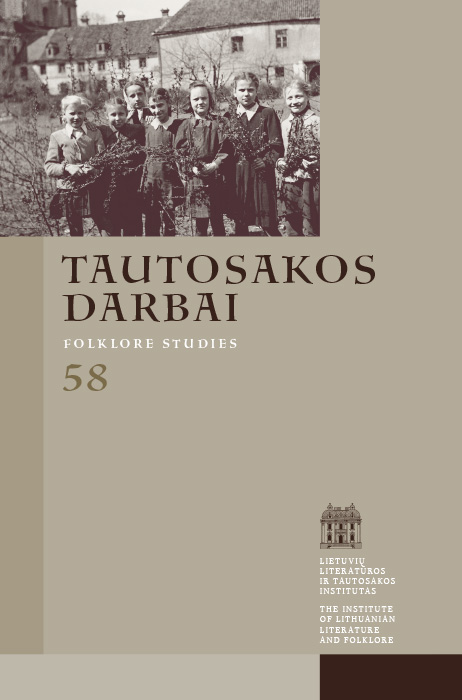Choices Creating the Modern Self in Oral Life Stories
Abstract
The autobiographical narrative, or life story, of a modern urban citizen is usually constructed in such a way that choices become its key moments. The modern urban man does not inherit their parents’ farm, does not continue the trade of their father or mother; instead, they choose everything that shapes them according to their demands and understanding. Choices thus become the key elements in the narrative portrait of the modern subject. This notion would suppose placing of the evaluating, deciding and choosing subject (ethical, social or political one) always in the foreground, with the entirety of the narrated life depending solely on their inner processes. These choices and decisions allegedly shape the narrative ego, or the narrating subject, which is at the core of any narrative. Such “self” does not contain any discrepancies or ambiguities; it is coherent, explicable and reasonable.
However, such notion of the modern autobiographical narrative is challenged by numerous researchers of memory. For instance, this article draws on the views by philosopher Emmanuel Levinas maintaining that choices include also the presence of what is different, new and unusual. The inner logic of the narrating subject, their reasoning and evaluations of the definite or abstract phenomena not necessarily determine the outcome of the choice. The most important choices are experienced, remembered and narrated as more or less unexpected inbreaks of the Otherness into the stable everyday routine. In some cases, this Otherness is experienced and remembered as a very strong emotion evoked by seeing another human being in distress, in other cases – as a fascinating and attractive novelty, and in yet others – as a discovery of one’s own physical abilities. Such cases are analyzed in this article on the basis of empirical data – namely, by employing fragments of three different autobiographical narratives.
The forth presented narrative reveals a different modern subject, who is indeed introduced as the one making rational choices, decisions and judgments. In this case, the oral narrative seems rather similar to a written or even literary autobiography. This narrative, which also creates the modern “self”, testifies to the existence of a different mode of constructing of the narrating subject, i.e. the one that is based on the ethical judgment and ceaseless rational consideration. The difference between the last example and the three earlier ones is striking: the three first stories represent an emotionally absorbed and adopted modernity, which manifests itself as an inclination to create, introduce, and spontaneously react to innovations, taking care of everything around. The fourth example demonstrates another way of interrelating the events in one’s life: namely, by rational and sober consideration, rejection of unacceptable local notions and creation of a coherent and universally righteous “self” (which takes into account only the most general principles formulated in the masterpieces of the global literature and philosophy). The author maintains that both such ways of constructing the modern “self” that are introduced in her article may exist in parallel, thus revealing the diversity and complexity of the modern “self”.
Downloads
Most read articles by the same author(s)
- Jurga Jonutytė, Letter as Subject for Anthropological Research , Tautosakos darbai: Vol. 66 (2023): Tautosakos darbai
- Jurga Jonutytė, Correspondence Time as an Alternative Plane: Togetherness, Encounter, Virtuality , Tautosakos darbai: Vol. 68 (2024): Tautosakos darbai
- Lina Būgienė, Giedrė Šmitienė, Jurga Jonutytė, On the Occasion of Publication of Janina Degutytė’s Letters , Tautosakos darbai: Vol. 69 (2025): Tautosakos darbai
- Giedrė Šmitienė, Jurga Jonutytė, Foreword , Tautosakos darbai: Vol. 68 (2024): Tautosakos darbai
- Jurga Jonutytė, Love and Method. Lessons and Example of Arendtian Tradition , Tautosakos darbai: Vol. 68 (2024): Tautosakos darbai
- Jurga Jonutytė, Identity without Lack: Reflecting on Three Memory Images , Tautosakos darbai: Vol. 53 (2017)
- Jurga Jonutytė, Sutartinės: Heritage as Motive for Radical Innovation , Tautosakos darbai: Vol. 60 (2020)
